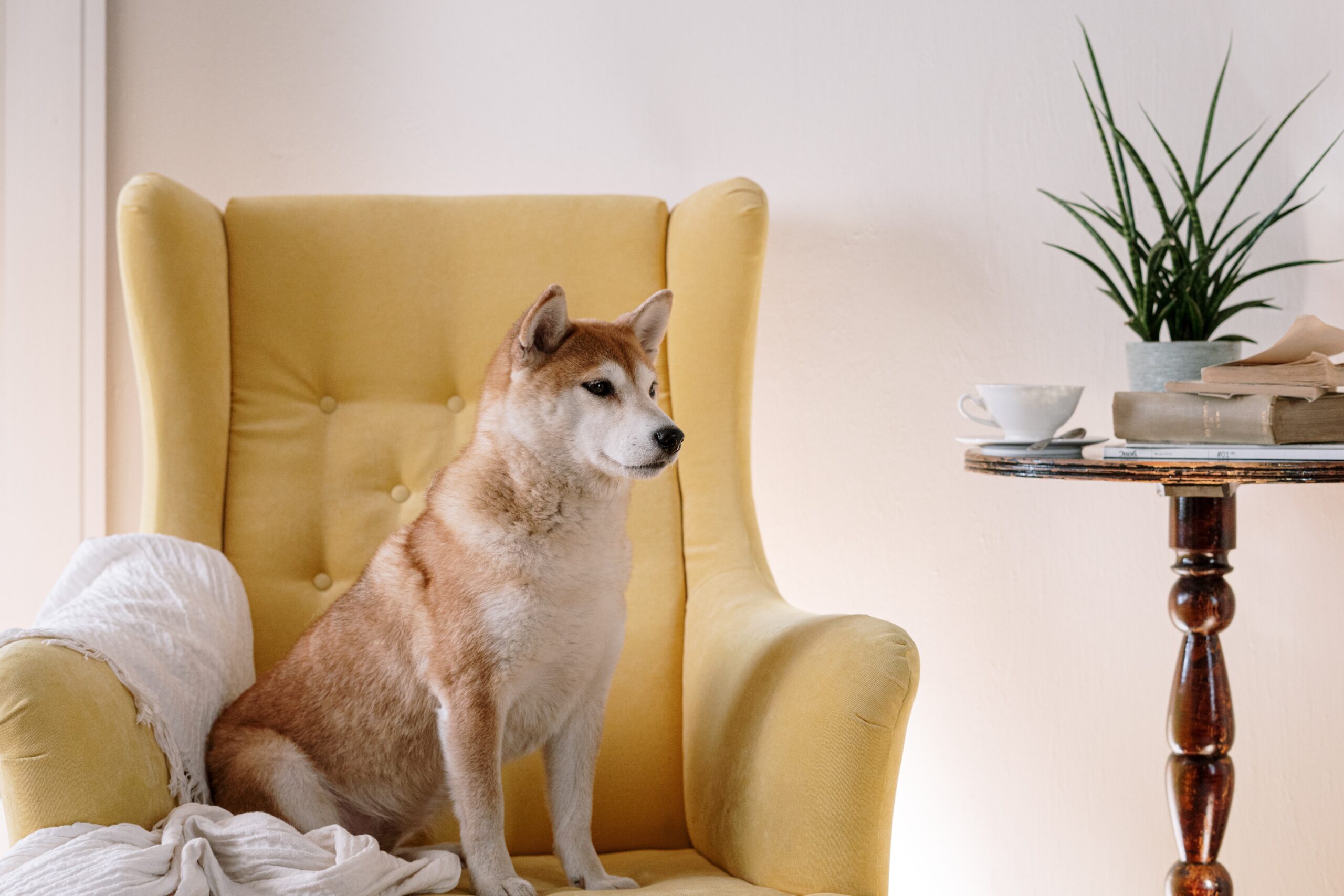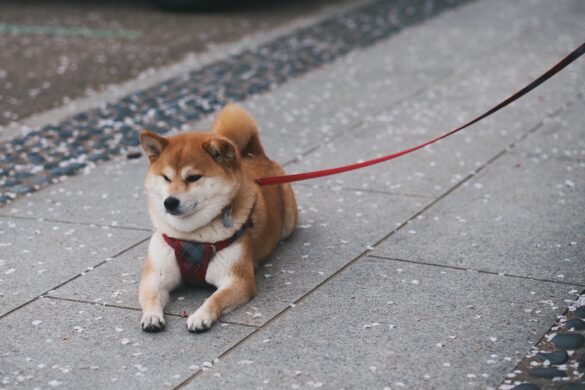Introduction
Shiba Inu is a breed of dog that originated in Japan and have become increasingly popular as pets in recent years. With their adorable fox-like appearance and unique personalities, it’s no wonder why so many people have fallen in love with these furry companions.
In this blog post, we’ll explore the many reasons why Shiba Inus make great family pets. From their lovable personalities to their adaptability, we’ll take a closer look at what makes these dogs such wonderful companions for households of all kinds.

Personality Traits of Shiba Inu
Shiba Inus are known for their unique personality traits that make them great family pets. Here are a few of the key characteristics of the breed:
Independence
Shiba Inus are independent dogs that enjoy their alone time. They don’t require constant attention and can be content spending time on their own. This can be a desirable trait for families who have busy schedules and may not be able to spend all their time with their pets.
Loyalty
Despite their independent nature, Shiba Inus are also incredibly loyal to their families. They are protective of their loved ones and will do whatever it takes to keep them safe. This loyalty makes them excellent watchdogs and companions.
Intelligence
Shiba Inus are highly intelligent dogs that are quick to learn new things. They are known for being independent thinkers and can be quite stubborn at times. However, with proper training and socialization, they can become well-behaved and obedient family pets.
These personality traits make Shiba Inus ideal family pets. Their independence means that they won’t become overly needy or clingy, while their loyalty and protectiveness ensure that they will always be there to watch over their loved ones.
Low Maintenance Needs
One of the reasons why Shiba Inus make wonderful family dog breed is because they have low maintenance needs. Here’s why:
Minimal Grooming Requirements
Shiba Inus have a short, dense coat that doesn’t require excessive grooming. They shed twice a year, during which they’ll require a bit more brushing to help remove dead fur. Aside from that, they just need occasional baths and nail trimmings.
Moderate Exercise Needs
While Shiba Inus enjoy a good walk or playtime, they don’t require excessive exercise like some other breeds. They are content with short walks and indoor play sessions, which makes them perfect for busy families who may not have the time or energy to take their pets on long hikes or runs.
These low maintenance needs make Shiba Inus an excellent choice for families who may not have a lot of time or resources to devote to grooming and exercising their pets. They won’t require expensive grooming appointments or excessive exercise routines, which means they are easy and affordable to care for.
Adaptability
Shiba Inus are an adaptable breed that can thrive in a variety of living environments. They can adapt well to apartment living as long as they get enough exercise and mental stimulation. They are not excessively vocal, which is a plus for apartment dwellers, and their small size means they won’t take up too much space.
Shiba Inus can also adapt well to living in houses with yards. They enjoy spending time outdoors, but they also love being close to their families. A fenced yard is recommended to keep them safe and secure.
Additionally, Shiba Inus are generally good with children and other pets when socialized properly. They are patient and gentle with children, and they can get along well with other dogs and cats in the household.
This adaptability to different living environments and ability to get along with children and other pets make Shiba Inus a great choice for families of all kinds.
Training and Socialization
Early training and socialization are crucial for Shiba Inus to develop good behavior and become well-adjusted family pets. Proper training and socialization can help them develop positive habits and prevent unwanted behaviors such as aggression or destructive chewing.
Shiba Inus are intelligent dogs, but they can also be stubborn and independent, making early training and socialization all the more important. Consistency, patience, and positive reinforcement techniques such as rewards and praise are key to successful training.
Socialization is also important for Shiba Inus to learn how to interact with people and other animals. It’s recommended to expose them to different environments, people, and animals from a young age, so they can develop good social skills.
Here are some tips for training and socializing your Shiba Inu:
Start training and socialization early
Begin training and socialization as soon as possible, preferably before the age of 16 weeks.
Use positive reinforcement techniques
Reward good behavior with treats and praise to encourage positive behavior.
Be consistent
Shiba Inus respond well to consistent training, so establish a routine and stick to it.
Socialize your Shiba Inu
Take your Shiba Inu to different places and introduce them to different people and animals, so they can learn to be comfortable and confident in different situations.
By investing time and effort into training and socialization, you can help your Shiba Inu become a well-behaved and happy family pet. With their loyalty, intelligence, and adaptability, Shiba Inus can make wonderful companions for families who are willing to put in the work to train and socialize them.
Health Concerns
While Shiba Inus are generally healthy dogs, they are still prone to certain health issues that all pet owners should be aware of. Some of the most common health concerns for Shiba Inus include allergies, hip dysplasia, and eye problems.
Allergies can cause skin irritation and itching in Shiba Inus, and they can be triggered by various things such as food, pollen, or environmental factors. Hip dysplasia is a genetic condition that affects the hip joint and can cause pain and mobility issues. Eye problems such as cataracts and glaucoma are also common in the breed.
To keep your Shiba Inu healthy, it’s important to schedule regular check-ups with your veterinarian. This will help detect any health issues early on and prevent them from worsening. Preventative care such as vaccinations and regular parasite control are also important for maintaining your dog’s health.
Proper nutrition and exercise are also crucial for a healthy Shiba Inu. A well-balanced diet that meets their nutritional needs can help prevent obesity and other health issues. Regular exercise and mental stimulation can help keep them in good physical and mental health, and also prevent destructive behaviors such as chewing or digging.
Shiba Inu as Watchdogs
Shiba Inus are naturally protective of their families and can make great watchdogs. They have a strong sense of loyalty and will do everything they can to protect their loved ones. This watchdog tendency can make them great family pets, as they will alert their owners to any potential danger or threat.
Training a Shiba Inu to be an effective watchdog while still being friendly with visitors requires proper training and socialization. Positive reinforcement techniques, such as rewarding good behavior, can be effective in training your Shiba Inu to be a watchdog. Additionally, exposing your dog to different people and situations from a young age can help them become more comfortable and friendly with visitors.
It’s important to note that Shiba Inus can be independent and stubborn at times, so consistency and patience are key when training them. It’s also important to avoid punishment-based training techniques, as this can damage the bond between you and your dog.
To Summarize;
In summary, Shiba Inus make excellent family pets due to their personality traits, low maintenance needs, adaptability, watchdog tendencies, and more. They are loyal, intelligent, and protective of their families, and can adapt to different living environments. With proper training and socialization, they can be great companions for children and other pets.
If you’re considering getting a new family pet, we encourage you to consider adopting a Shiba Inu. They may be the perfect addition to your family, bringing joy and love for years to come. Remember to do your research and find a reputable breeder or adoption agency, and provide your new furry friend with the love and care they deserve.
Thank you for reading and we hope you found this article helpful.
